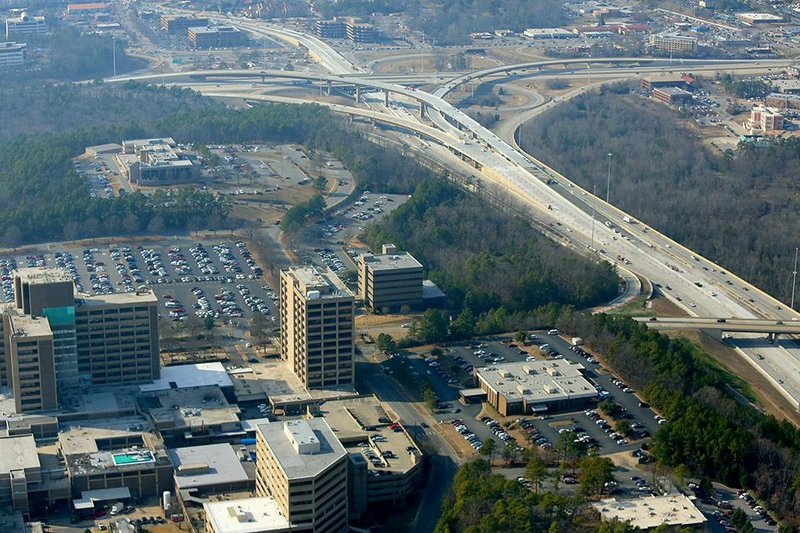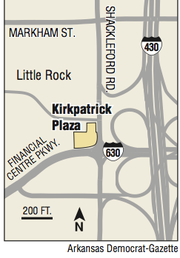The Arkansas Highway and Transportation Department is still paying for the Interstate 430/Interstate 630 remake more than a year after the project was completed.
The project cost $150 million, but the department spent an additional $6.5 million to acquire property, including $1.5 million for little more than a third of an acre of a larger parcel where a five-story office building sits, according to a consent judgment filed in Pulaski County Circuit Court earlier this month.
The consent judgment settled a condemnation lawsuit the department filed six years ago to acquire the property and the temporary use of an even smaller parcel -- 0.11 acre -- during the construction.
The lawsuit was filed on Sept. 17, 2010, against Kirkpatrick Plaza LLC, the owners of Kirkpatrick Plaza office building at 10800 Financial Centre Parkway. It is at the northwest corner of Financial Centre and South Shackleford Road in west Little Rock.
The department had deposited $639,000 into the court registry as "just compensation" for the property acquisition and use based on an appraisal done before construction began.
The owners waited until after the construction was completed to seek their own appraisal, David Wilson, a partner with the Little Rock law firm of Friday, Eldredge & Clark, who represented the property's owners, said Thursday.
That appraisal came in at $1.6 million, said Danny Straessle, the department spokesman.
As part of the settlement, the landowner "has offered to consent to judgment for $1,525,000 as just compensation in this matter," according to the four-page consent judgment filed on Oct. 4.
The project created major problems for the property, Wilson said.
For one, the project "substantially impaired" the ability of tenants, employees and customers to get into and out of the property, he said.
The property also lost several parking spaces, which left the property owner in violation of some of the leases, Wilson said. Those leases "specified parking space requirement," he said.
To offset difficulties created by the project, the property owner was required to obtain additional property north of its property to provide for additional parking and an alternate way to access the property, Wilson said.
The department agreed to the settlement "in the interests of the department, the taxpayer and the landowner," Straessle said. "Short of sending something to trial, sometimes it's easier to do what we did."
The city of Little Rock also incurred significant right-of-way costs associated with its portion of the project.
The Arkansas Supreme Court on Thursday dismissed an appeal from the city of Little Rock over an eminent-domain award exceeding $500,000, saying the city failed to follow the rules on providing a $1,500 transcript from the trial.
Through eminent domain, Little Rock paid $78,575 in September 2010 for land near the interchange. The landowners -- Hermitage Development Corp., LVW Associates partnership and other individuals -- sued and were awarded $510,675, plus interest, in May 2015 in Pulaski County Circuit Court.
The overhaul of the interchange was completed in three phases over six years and was designed to accommodate future traffic growth of up to 200,000 vehicles per day. Before construction began, traffic counts showed nearly 100,000 vehicles a day where the two interstates come together.
The interchange was given the name the Big Rock Interchange for the 5 million-pound rock formation on the southeast quadrant. The formation was uncovered during construction, and the interchange's design was slightly altered to leave much of the outcropping undisturbed.
A Section on 10/21/2016


